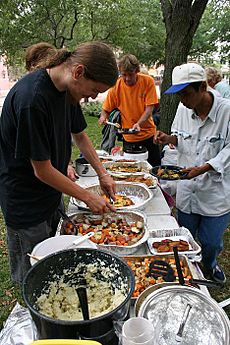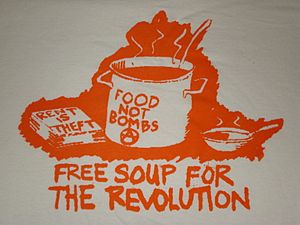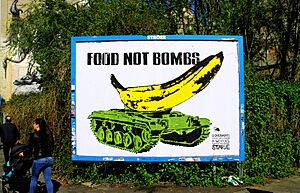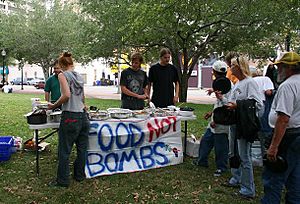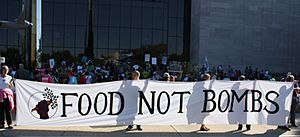Food Not Bombs facts for kids

Food Not Bombs logo
|
|
| Type | Network of collectives |
|---|---|
Food Not Bombs (FNB) is a group of volunteers who share free, usually vegan (no animal products) and vegetarian (no meat) food with people. They believe that there is enough food in the world for everyone. They also think that governments and big companies sometimes focus on other things, like war, instead of making sure everyone has food.
To show this, Food Not Bombs uses food that grocery stores, bakeries, and markets would otherwise throw away. They collect this extra food and share it. This way, they show how much good food goes to waste while people are still hungry.
Contents
What Food Not Bombs Believes
Food Not Bombs is a worldwide movement run by volunteers. They share free meals as a way to protest against war and poverty. Each local group, called a chapter, collects extra food from stores. This food would usually be wasted. Sometimes, they also get food donated by local farmers. Then, they cook free meals for anyone who is hungry.
Here are some of the main ideas of Food Not Bombs:
- Most meals are vegan or vegetarian.
- All meals are free for everyone.
- Each local group is independent and makes its own choices. They use consensus, meaning everyone agrees on decisions.
- They believe in nonviolence, which means solving problems without fighting.
- They think "food is a right, not a special favor."
Along with these beliefs, Food Not Bombs aims to:
- Help fight poverty and homelessness.
- Bring hungry people together in their communities.
- Let anyone volunteer to help cook and then eat the food.
How Food Not Bombs Started
The Beginning in the 1980s
Food Not Bombs began in 1980 in Cambridge, Massachusetts. It was started by anti-nuclear activists like Keith McHenry. The name "Food Not Bombs" came about when they realized they were giving food to people in need. This was happening right across the street from a place that was rumored to be designing nuclear weapons. This made them think: "There are hungry people here, and across the street, people are making weapons. We should be called 'Food Not Bombs.'"
Keith McHenry has been a volunteer for over 35 years. He still helps share food almost every week in different cities. In the 1980s, members of Food Not Bombs not only shared food but also marched and protested. They spoke out against nuclear power, the US involvement in the Salvadoran Civil War, and unfair treatment of homeless people.
The first time people were arrested for sharing free food was on August 15, 1988. This happened at the entrance to Golden Gate Park in San Francisco, California. Nine people were arrested that day, including Keith McHenry. Over time, the city made more than 1,000 arrests related to these activities.
Challenges in the 2000s
In the summer of 2007, the Food Not Bombs group in Fort Lauderdale, Florida, faced problems with local police. The police tried to stop them from sharing food. However, many supporters came together and convinced the police to back down for a while.
The city of Orlando, Florida, also made a rule that stopped groups from serving food to many people without a special permit. In late 2007, Eric Montanez from Orlando's Food Not Bombs was accused of breaking this rule. But a jury found him not guilty.
Food Not Bombs and a church for homeless people then sued the city. They argued that sharing food was a form of free speech and religious activity. They won the lawsuit, and the city's rule was overturned. However, the city appealed, and the legal battles continued for years.
In May 2008, business owners in Kitchener, Ontario, tried to stop the local Food Not Bombs group. They didn't like the group sharing meals in a busy downtown area. They said the group supported meat-free diets and was against capitalism.
In April 2009, the city of Middletown, Connecticut, ordered the local Food Not Bombs chapter to stop. The city's health inspector said they were giving out food without a license. Later, the group started working with a licensed kitchen provided by a church.
One of the most talked-about restrictions on sharing food happened in Florida in 2011. Similar rules were also made in cities like Philadelphia and Houston.
Recent Activities in the 2010s and 2020s
In 2011, a court in Florida supported Orlando's rule against sharing food without a permit. The mayor of Orlando, Buddy Dyer, even called Food Not Bombs activists "food terrorists," which caused a lot of criticism.
Hackers, who said they were part of the group Anonymous, started making threats against Orlando. They even took down some city websites. After more arrests and national attention, Orlando's Food Not Bombs agreed to move their food sharings to City Hall. This stopped the arrests and led to a new agreement.
A hacktivist named Christopher Doyon was arrested for the Orlando cyber attacks. He said his actions were a form of cyber-civil disobedience. In August 2011, the mayor of Orlando announced that charges against the food sharers were dropped. This showed a new understanding between the city and Orlando Food Not Bombs.
In 2011, Sarasota, Florida, also made rules about gatherings. They required permits for groups of 75 or more people. Other rules targeted homeless people, like banning smoking and removing park benches.
Food Not Bombs groups were very active in supporting the Occupy Wall Street movement in 2011. They set up kitchens in protest camps across the US.
In August 2012, a Food Not Bombs World Gathering took place in Tampa, Florida. This was just before the Republican National Convention. Food Not Bombs activists prepared food for hundreds of protesters.
Near the end of 2012, Food Not Bombs activists, especially in Long Island, helped thousands of people after Superstorm Sandy. They used food that would have gone to waste to help communities affected by the storm.
In November 2014, Fort Lauderdale again tried to ban food sharing. Several Food Not Bombs activists were arrested for sharing food. They even went on a hunger strike to protest the law. A court order stopped the ban in December 2014. On August 22, 2018, a US court ruled that outdoor food sharing by Food Not Bombs was protected under the First Amendment.
More recently, in 2023, a Food Not Bombs chapter in Houston received many tickets. This was because of a city rule from 2012. It says that groups need permission from property owners to give out free meals to more than five people. Some of these tickets were later dismissed. Also in September 2023, three Food Not Bombs volunteers were charged in West Palm Beach, Florida, under a similar rule.
See also
 In Spanish: Food not Bombs para niños
In Spanish: Food not Bombs para niños
- Bill Emerson Good Samaritan Act of 1996
- Curry Without Worry
- DIY ethic
- Dumpster diving
- Freeganism
- Give-away shop
- Homeless ministry
- Langar, a centuries-old tradition where vegetarian meals are supplied free of charge to the hungry at Sikh temples worldwide.
- Langar (Sufism), an Islamic tradition where free food is provided.
- One World Cafe
- Rumford's Soup
- SAME Cafe
- Volxkuche, a type of food kitchen with a secular / alternative culture character.
 | Anna J. Cooper |
 | Mary McLeod Bethune |
 | Lillie Mae Bradford |


